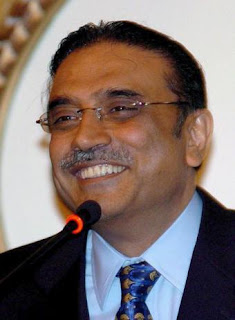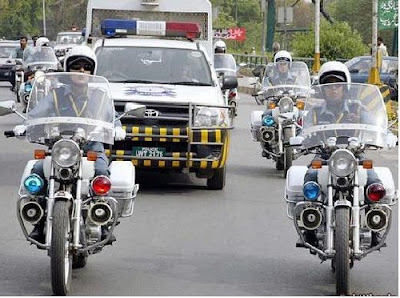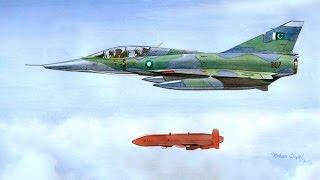Zardari Signals Policy Shifts, Wants $100b Bailout

Mr. Asif Ali Zardari, Pakistan's new president, spoke to Brett Stephens of the Wall Street Journal last week. His interview covered a wide range of subjects including the ongoing insurgency, Afghanistan, FATA, and relations with US and India. He repeatedly brought up the subject of financial help for his government from the US and the world to deal with Pakistan's growing economic crisis. He is clearly pleading for a US-led economic bailout of Pakistan to halt rapid deterioration and to consolidate his power.
Here are some of the key points Mr. Zardari made:
1. India is "not a threat" to Pakistan. "India has never been a threat to Pakistan," he said, adding that "I, for one, and our democratic government is not scared of Indian influence abroad."
2. Those fighting Indian rule in Kashmir are "terrorists". He spoke of the militant Islamic groups operating in Kashmir as "terrorists" -- former President Musharraf would more likely have called them "freedom fighters" -- and allowed that he had no objection to the India-U.S. nuclear cooperation pact, so long as Pakistan is treated "at par." "Why would we begrudge the largest democracy in the world getting friendly with one of the oldest democracies in the world?"
3. Pakistan has given consent to US air strikes inside FATA. Mr. Zardari seemed eager to downplay any differences with the U.S. "I am not going to fall for this position that it's an unpopular thing to be an American friend. I am an American friend." The firing on the U.S. aircraft was, he said, merely an incident, "and while incidents do happen, they are not important." He went off the record to describe sensitive military subjects, but acknowledged that the U.S. is carrying out Predator missile strikes on Pakistani soil with his government's consent. "We have an understanding, in the sense that we're going after an enemy together."
4. With foreign reserves to cover only two months worth of imports and Pakistan's dire economic situation, he wants US and world's help to the tune of $100b to support his democratic government and its war against militants. "I need your help," he said more than once. "If we fall, if we can't do it, you can't do it." "Aid is proven through the researches of the World Bank . . . [to be] bad for a country," he says. "I'm looking for temporary relief for my budgetary support and cash for my treasury which does not need to be spent by me. It is not something I want to spend. But [it] will stop the [outflow] of my capital every time there is a bomb. . . . In this situation, how do I create capital confidence, how do I create businessmen's confidence?"
Brett Stephens characterized the economic crisis Mr. Zardari spoke of as "at least in part, a crisis of confidence in him."
Speaking of the recent Islamabad Marriott bombing, Mr. Zardari again brought the subject around to his economic problem. "If I can't pay my own oil bill, how am I going to increase my police?" he asked. "The oil companies are asking me to pay $135 [per barrel] of oil and at the same time they want me to keep the world peaceful and Pakistan peaceful."
5. He used phrases such as Pakistan's war is "my war," its fighter jets "my F-16s," its Intelligence Bureau "my IB." In recent weeks there have been reports that Pakistan has deployed F-16s against tribal insurgents, in part because the army's own frontier troops have been routinely routed in ground fighting. Their problems aren't simply tactical. "What kind of a joke is this that I cannot pay my security personnel more than the Talibs are paying?" he asked. "Those terrorists are paying their soldiers 10,000 rupees; I'm paying seven or six thousand rupees."
6. On the corruption issue, he said, it "has been used for a long time as a political tool," particularly by "radicals" trying to give democracy a bad name. Foreign investors, he said, have been coming to Pakistan for decades, and "none of them have complained about corruption."
A lot of what President Zardari said to Brett Stephens in this interview will be seen as highly controversial in Pakistan by the military leadership, policy think tanks and analysts, as well as the opposition parties. Much of it will likely be a surprise to Pakistan's foreign policy establishment, career diplomats and the government bureaucracy that has the responsibility of developing policy toward India and the United States. It seems that he was not briefed or, if he was, he simply chose to ignore the briefing he was given.
Does this interview signal a fundamental shift in Pakistan's posture and policies toward India and the US? On the face of it, it does seem so. However, only time will tell if and when such changes are practically implemented, and how they are received by Pakistanis, Indians and Americans. Regardless of Mr. Zardari's real intentions in strongly hinting at a major policy shift, it is unlikely that a US-led bailout of Pakistan would be forthcoming at a time when the US economy is headed into a recession, limiting the options open to any incoming administration in Washington.



Comments